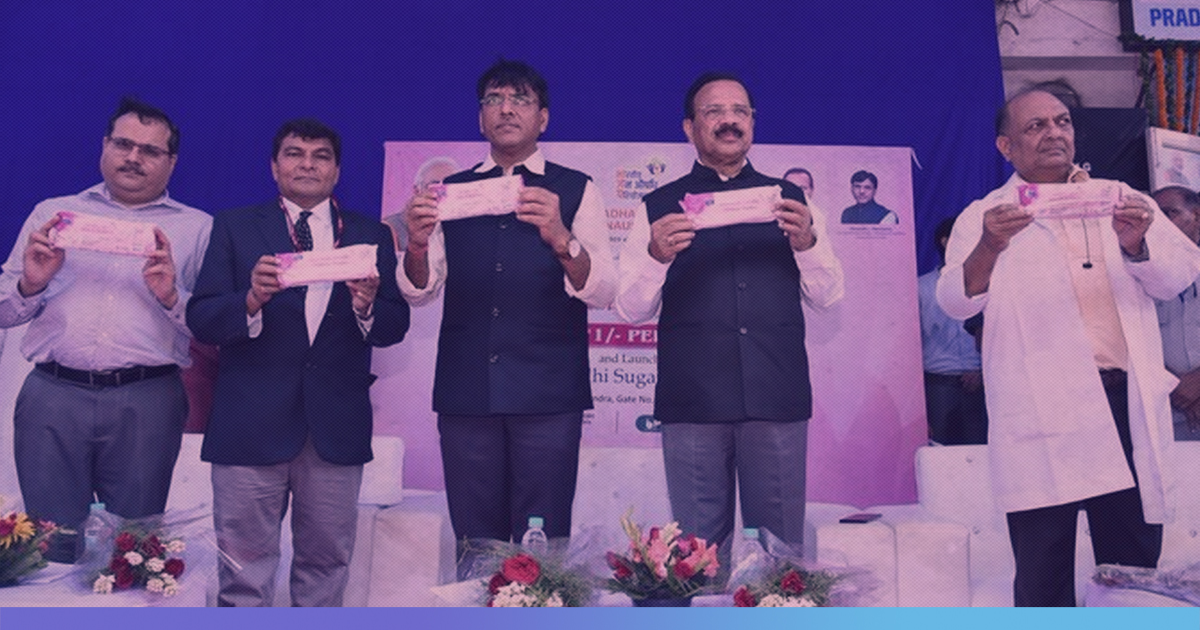In a bid to make sanitary pads more accessible and affordable to women, the Government on Monday, August 26 reduced the price of Jan Aushadhi Suvidha Oxo-Biodegradable Sanitary Napkin from Rs 2.50 to Re 1 per pad.
The biodegradable sanitary napkin ‘Suvidha’ will be sold in packets of four and will be available at the subsidised rate in specific centres across the country.
The government has also launched Jan Aushadhi Sugam Mobile App which provides the details of products available in these stores and also helps in locating nearby stores.
“About 28 million girls are reported to be leaving education because of lack of availability of good quality Sanitary Napkin pads at a reasonable cost. Suvidha napkin will now be available at only One Rupee per pad,” Mansukh L. Mandaviya, Minister of State for Chemicals & fertilisers told the media.
#WomenEmpowerment isn’t about just featuring successful women, it is about focusing on health, hygiene & comfort of women across the country. Proud to launch #Suvidha now at just ₹1/pad. This will ensure hygienic periods to crores of my sisters and mothers. #SuvidhaHuaSasta pic.twitter.com/HmqEKO1UyD
— Mansukh Mandaviya (@mansukhmandviya) August 27, 2019
“During the last one year, around 2.2 crore sanitary napkins have been sold from these stores. With the reduction in the prices, we expect the sales to jump over two times. We are focusing on quality, affordability and accessibility,” Mandaviya added.
The move is aimed at fulfilling the promises made by PM Modi in 2019 General Elections manifesto. The PM had promised a more affordable and accessible supply of sanitary pads across India if he comes back to power.
Sanitary napkins to be available for Rs 1 at Jan Aushadhi stores https://t.co/fdGqAAFZDT
— NarendraModi App (@NamoApp) August 28, 2019
In June 2018, the government introduced the Jan Aushadhi Suvidha Oxo-Biodegradable Sanitary Napkin at Rs 2.50 per pad. Over 1.30 crore pads were sold at Pradhan Mantri Bhartiya Janaushadhi Kendras under Pradhan Mantri Bhartiya Janaushadhi Pariyojana (PMBJP) till 31 July 2019.
The product is available in more than 5500 Pradhan Mantri Bhartiya Jan Aushadi Pariyojana Kendras across the country. Mandaviya also added that the government will ensure that there is no diversion of subsidised sanitary napkins.
The essential step is aimed at providing hygienic means to women who are still dependent on unhygienic aids during menstrual periods as they cannot afford sanitary pads.
The use of unhygienic products during menstruation, like fibres, and old dirty clothes at times leads to fungal infections, Reproductive Tract Infection, Urinary Tract Infection, cervical cancer and also make some females vulnerable to infertility.
According to the National Family Health Survey 2015-16, about 58 per cent of women aged between 15 years and 24 years use local napkins and tampons. The survey also pointed out that about that only 48 per cent of women in rural areas have access to sanitary napkins.
The Suvidha napkin has a special additive that makes it 100 per cent biodegradable when it reacts with oxygen after it is used and disposed of.
According to Menstrual Health Alliance India, an NGO, sanitary napkins comprise over 45 per cent of menstrual waste, which is discarded as routine waste along with household garbage. This is a potential health hazard. Moreover, the disposal of non-biodegradable sanitary napkins available today creates a huge environmental problem. In such a scenario Suvidha napkin comes with the dual advantage of being affordable and eco-friendly at the same time.
Also Read UP: Pregnant Woman Who Was Rebuked By DM For Expecting Fourth Child Dies After Giving Birth











